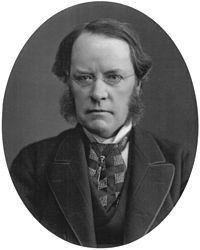Lyon Playfair, 1st Baron Playfair
|
The Right Honourable The Lord Playfair GCB PC FRS |
|
|---|---|
 |
|
| Postmaster General | |
|
In office 18 November 1873 – 17 February 1874 |
|
| Monarch | Queen Victoria |
| Prime Minister | William Ewart Gladstone |
| Preceded by | William Monsell |
| Succeeded by | Lord John Manners |
| Chairman of Ways and Means | |
|
In office 1880–1883 |
|
| Monarch | Queen Victoria |
| Preceded by | Henry Cecil Raikes |
| Succeeded by | Sir Arthur Otway, Bt |
| Vice-President of the Committee on Education | |
|
In office 13 February 1886 – 20 July 1886 |
|
| Monarch | Queen Victoria |
| Prime Minister | William Ewart Gladstone |
| Preceded by | Sir Henry Holland, Bt |
| Succeeded by | Sir Henry Holland, Bt |
| Personal details | |
| Born |
1 May 1818 Chunar, Bengal, British India |
| Died |
29 May 1898 (aged 80) South Kensington, London |
| Nationality | British |
| Political party | Liberal |
| Spouse(s) | Margaret Oakes (d. 1855) Jean Millington (d. 1877) Edith Russell (d. 1932) |
| Alma mater |
University of St Andrews University of Edinburgh |
Lyon Playfair, 1st Baron Playfair GCB PC FRS (1 May 1818 – 29 May 1898) was a Scottish scientist and Liberal politician.
Playfair was born at Chunar, Bengal, the son of George Playfair, Inspector General of Hospitals in that region, and Janet, daughter of John Ross. The family was fairly middle class with strong academic roots in University of St Andrews. All of Playfair's siblings were sent back to Scotland to avoid the hazards of an Indian upbringing. Playfair was named after his uncle, Sir Hugh Lyon Playfair, and was educated at the University of St Andrews, the Andersonian Institute in Glasgow, and the University of Edinburgh. After going to Calcutta at the end of 1837, he became private laboratory assistant to Thomas Graham at University College, London, and in 1839 went to work under Justus Liebig at the University of Giessen.
After returning to Britain, Playfair became manager of a calico works in Primrose, near Clitheroe, and in 1843 was appointed Professor of Chemistry at the Royal Manchester Institution, where he was assisted by Robert Angus Smith. Two years later, he was made chemist to the Geological Survey, and subsequently became Professor in the new School of Mines. In 1848, he was elected to the Royal Society, and three years later was made Special Commissioner and a member of the executive committee of the Great Exhibition.
...
Wikipedia
